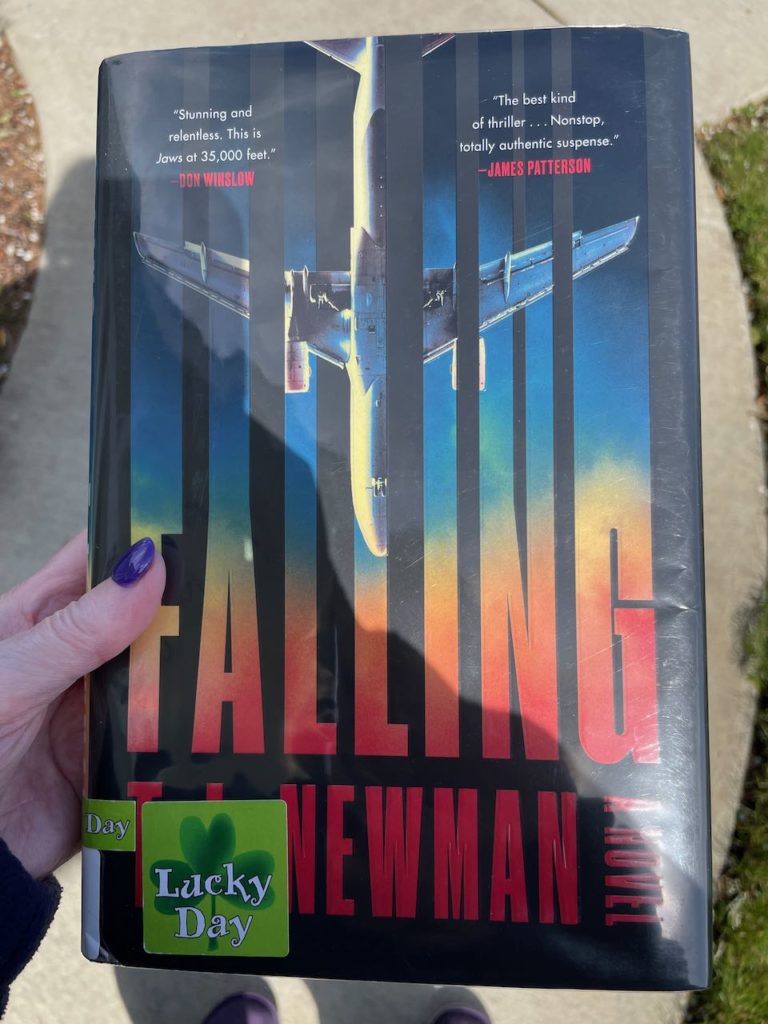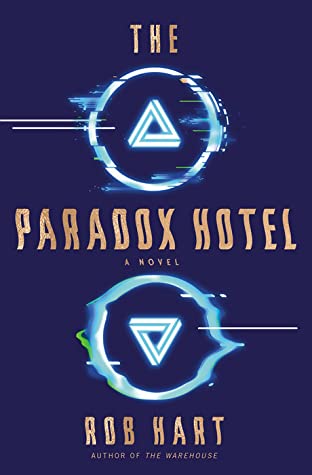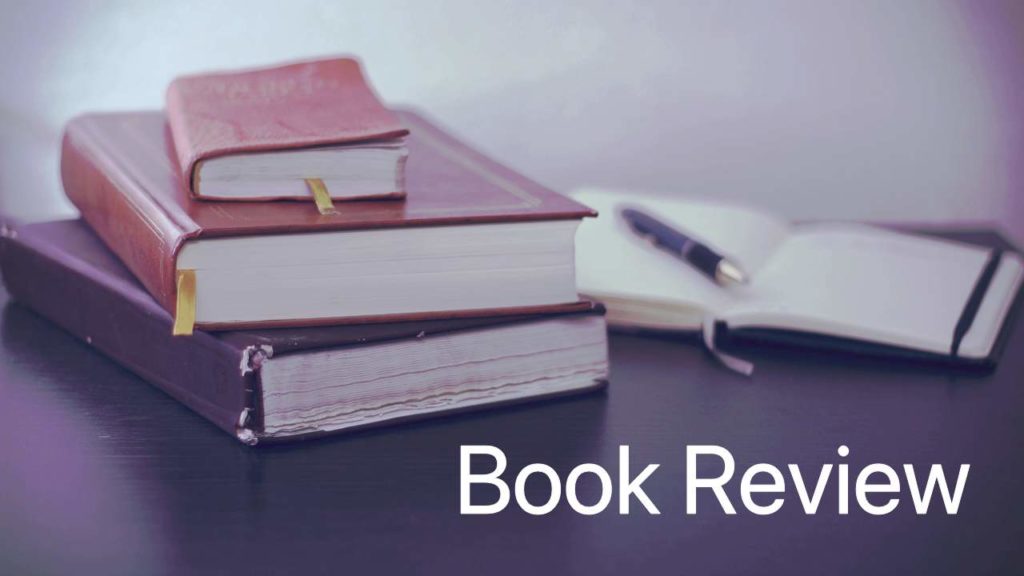
Falling by T.J. Newman
Simon & Schuster, 2021
Hardcover, 304 pages
ISBN 978-1-9821-7788-1
When Bill Hoffman arrives at Los Angeles International Airport to pilot Coastal Airways flight 416 to New York, he expects a routine day. It’s not until the plane is in the air that he learns today will be anything but routine. When he receives a video call on his laptop, he sees his wife and son with black hoods over their heads, his wife wearing a suicide vest.
“You will crash your plane or I will kill your family,” the caller tells Bill.
And we’re off, as Bill Hoffman thinks desperately about how to keep both his family and his passengers alive.
What a plot premise like this, I expected the book to rely most heavily on plotting. But what makes this story work is Newman’s skill at both character development and plot action. We meet Hoffman’s family: wife Carrie, 10-year-old Scott, and 10-month-old Elise.
But the real stars are the cabin crew, experienced Jo and Big Daddy, and new hire Kellie. Hoffman is in charge up front, but he knows he can count on Jo and her crew to take care of the passengers.
Still, the plot does require some external help. The phone hijacker has warned Bill that he is to tell no one. If law enforcement approaches the Hoffman house to try to rescue the family, he’ll kill them, he tells Bill. Fortunately, Jo has a personal connection with an FBI agent. And there’s a late plot twist that arrives unexpectedly.
Nonetheless, this is an intense suspense thriller that kept me turning pages eagerly. I’d recommend it as a good travel read—but only if you’re not going by plane.
T.J. Newman worked as a flight attendant for 10 years. According to the jacket copy, she wrote most of Falling on red-eye cross-country flights. This is her debut novel.
© 2022 by Mary Daniels Brown

The Paradox Hotel by Rob Hart
Ballantine Books, 2022
Hardcover, 336 pages
ISBN 978-1-9848-2064-8
The book opens with the following epigraph:
“It’s a poor sort of memory that only works backwards.”
—the White Queen in Through the Looking-Glass by Lewis Carroll
Right from the beginning, we recognize we’re not in Kansas anymore. January Cole, our first-person narrator, is Unstuck in time, a condition that inevitably worsens and leaves its victims in “a glassy-eyed coma” that lasts until the body gives out.
In the year 2072, science has learned how to travel through time, but only into the past, not into the future. January is director of security at the Paradox Hotel, the place where visitors, dressed in costumes of the time period they’re going to visit, stay when they arrive at the time portal. But the scientific exercise of time travel is draining the U.S. budget, so the Time Enforcement Agency is about to privatize the whole operation.
Over the past few years I’ve read more science fiction than I’d read in the entire first half-century of my life because I became interested in how our memories shape our sense of self. (See, for example, my review of Dark Matter by Blake Crouch.)
This type of fiction requires world building, creation of the world in which the action takes place. I found the world building in this novel frustrating. For about the first half I had trouble keeping track of the characters. In the story, four trillionaires arrive for a meeting at which they will bid on the contract to privatize the time travel industry. Each bidder has an entourage, and there were just too many names to keep track of.
I also thought that the mechanism of how the time travel world worked in the book wasn’t adequately laid out. Perhaps I got so hung up trying to keep all the characters straight that I missed some important exposition. But near the end the book introduces an entirely new concept, the jabberwocky, necessary for resolution of the action.
I was also bothered by the pacing. The story moves slowly through about three-quarters of the novel, then everything, including the introduction of that new concept, rushes to the conclusion.
However, I appreciated that the novel raises some philosophical and practical questions around its central premise of the benefits and drawbacks of something like time travel. Assuming that it could be scientifically achieved, what restrictions or laws would be necessary to regulate it? Could we count on a federal body such as the Time Enforcement Agency? What would be the effects if a government decided to privatize the industry? And who would be in charge of formulating the regulations? Whom can we count on to devise regulations that protect the general good rather than offering unlimited opportunity for personal financial gain? Could we—or how would we—prevent individuals from making changes for their own benefit in the past that might destroy reality?
And I also appreciated how The Paradox Hotel mixes genres to maximize its punch. At its most obvious, it’s a science fiction novel. In addition to the time travel element, one of its most engaging minor characters is a talking robot drone named Ruby who’s a helpful personal assistant to January Cole. The novel also incorporates a mystery in the presence of a corpse that only January, with her Unstuckness, can see in one of the hotel rooms. Other mysterious questions that require answers are why clocks are sometimes running backwards and occasionally altogether dropping little slices of time.
Yet overall, this novel is a love story, and the story of the pain and grief caused by love’s loss. In the opening scenes we learn that January Cole is lying about her Unstuck condition. Only people who are in its earliest stage, stage 1, can continue to work anywhere near the time portal. Yet January is nearing the end of stage 2, after which she will slip into that “glassy-eyed coma” that is stage 3. She’s taking way too much medication and lying about her condition in order to keep her job at the Paradox Hotel.
Gradually we learn why January is so desperate to keep working at the hotel: because, when she uncontrollably slips back into the past, it’s the only place where she can see her lover, Mena. January will risk anything to be able to relive those memories. This thread—the significance and power of memory—is what made me request The Paradox Hotel from the library. Despite this novel’s shortcomings, it’s fertile ground for the study of Life Stories in Literature.
© 2022 by Mary Daniels Brown



Pingback: Literary Links – Notes in the Margin